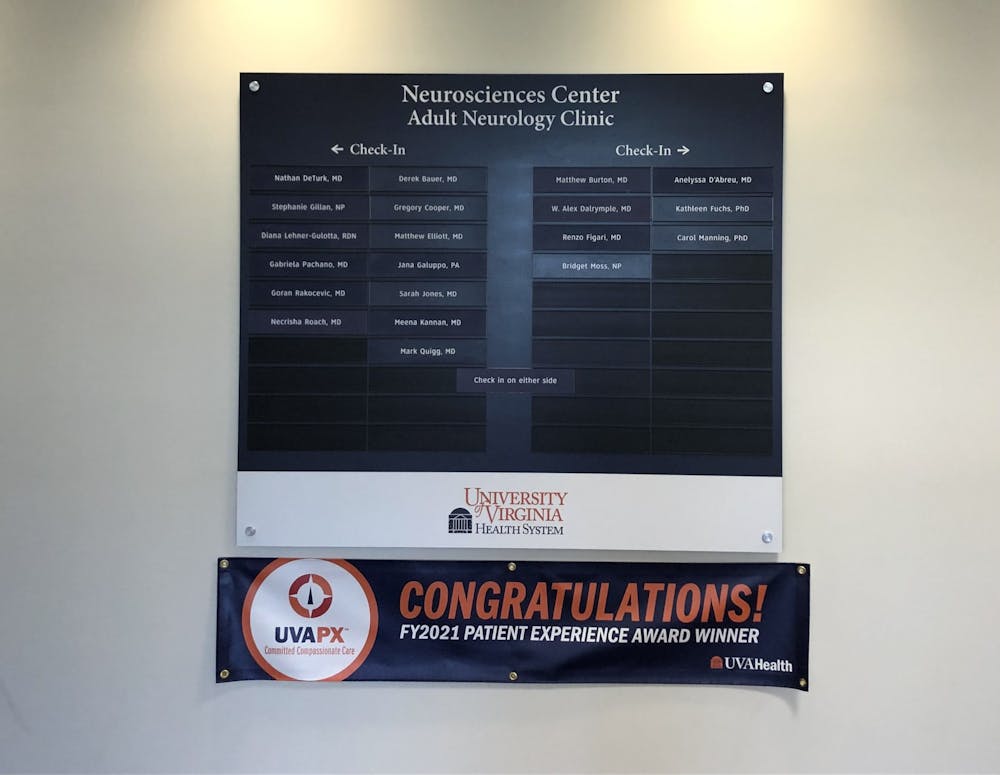U.Va. Health’s epilepsy-specialized clinics in Southwest Virginia were recently awarded a $500,000 grant from the Genan Foundation to fund research, development and expansion. The grant emphasizes training of the clinic fellows, encouraging them to lead research initiatives and get further involved within the clinic community.
Established in the rural towns of Tazewell, Abingdon and Wise, the clinics have been providing patient care to otherwise underserved populations for around five decades. Nathan Fountain, an attending neurologist at the clinics who has been working at the clinic for around thirty years, said that the received grant will greatly help increase the clinics’ impact.
“The grant is to fund research development by an epilepsy fellow and to consequently increase our ability to see patients in rural southwest Virginia,” Fountain said. “Part of those projects is to do clinical trials of new drugs, devices and treatments for epilepsy. Part of clinical trials are also to examine the effects and epidemiology of epilepsy that will affect southwest Virginia.”
Epilepsy, a disorder of the brain which causes seizures, affects 3.4 million people in the U.S., around 500,000 of whom are children. In Virginia alone, there are 80,000 residents with epilepsy. The disease, in many cases, can be debilitating and requires medical attention, allowing epilepsy-specialized clinics — where professionals have much more extensive specialized knowledge of the condition — to play a critical role.
“We know that if you see a specialist, your care and outcomes are better,” Fountain said. “We have access to special diagnostic tools and certain kinds of treatments that others do not. But in many areas, there are no neurologists whatsoever. So, without us, [those patients] would not have access to any kind of specialty neurology care.”
Since patients in rural areas of the state often do not have access to this care, U.Va. Health is leading the change. Established in the 1970s, the clinics have been serving thousands of patients — adult and pediatric alike — for decades. The clinics are an extension of the University neurology department and are categorized as Level 4 epilepsy centers, which means they provide the highest and most comprehensive level of care as designated by the National Association of Epilepsy Centers and the U.S. Department of Health. This makes Virginia particularly unique in providing widespread epilepsy care to residents.
“There's only a few places in the country that provide a rural extension of a large tertiary care center, a large epilepsy center,” Fountain said. “That means that in Virginia, almost everybody … is within a hundred miles of access to a high level epilepsy specialist.”
Mark Quigg, another attending neurologist at the clinics, believes that the comprehensive rural care provided by U.Va. Health’s neurology department, such as outreach clinics that extend their services beyond a centralized campus, is an innovative and effective model that can be implemented in other health programs. The grant will assist in solidifying the success of the Virginia-based program in hopes of eventual national expansion.
“Our endeavor is highly unusual in that there are just not that many programs with this length and breadth of investment in outreach clinics,” Quigg said. “Outreach clinics, in general, should be something that we consider more when discussing public health care.”
Furthermore, research — which the grant will also significantly expand — is one of the key aspects that furthers the impact of the rural clinics.
“We’re an academic epilepsy center,” Quigg said. “We're doing studies on medications, surgical treatments for epilepsy, its epidemiology, or characteristics of large groups of patients with epilepsy. Having a large pool of patients helps us advance the field of epilepsy.”
More than just delivering patient care, the clinics also serve as a bridge between communities, providing opportunities to teach and learn.
“[The clinics] are unique as a teaching experience because they allow us to leave the main university and give the experience for doctors in training [to provide] direct care in a culturally sensitive way to a rural population,” Fountain said.
Since its establishment, doctors, fellows, residents and nurses alike have valued the experiences that the clinics have provided. According to both Quigg and Fountain, the opportunity provided by the clinics to directly impact a tight-knit community of patients is extremely rewarding for the medical community.
The clinics are also bringing awareness of the disease in areas where the population does not have much access to informative resources about epilepsy — an effort that the grant will bolster. Fourth year College student Liya Tadesse, a volunteer for the Epilepsy Foundation of Virginia, believes that this recognition and treatment is important to epilepsy education.
“A lot of people are not aware of epilepsy and what having a seizure looks like,” Tadesse said. “We want to…create more awareness, so people can know what to do.”
For the past few decades, the clinics have provided specialized healthcare to historically underserved regions, and the recently awarded grant will allow the clinics to continue and expand these efforts.
“I want to express our appreciation for [the Genan Foundation’s] support with our efforts in the epilepsy program,” Fountain said. “The ultimate product of the grant will be to improve how we take care of people with epilepsy. We are launching a whole larger effort.”







